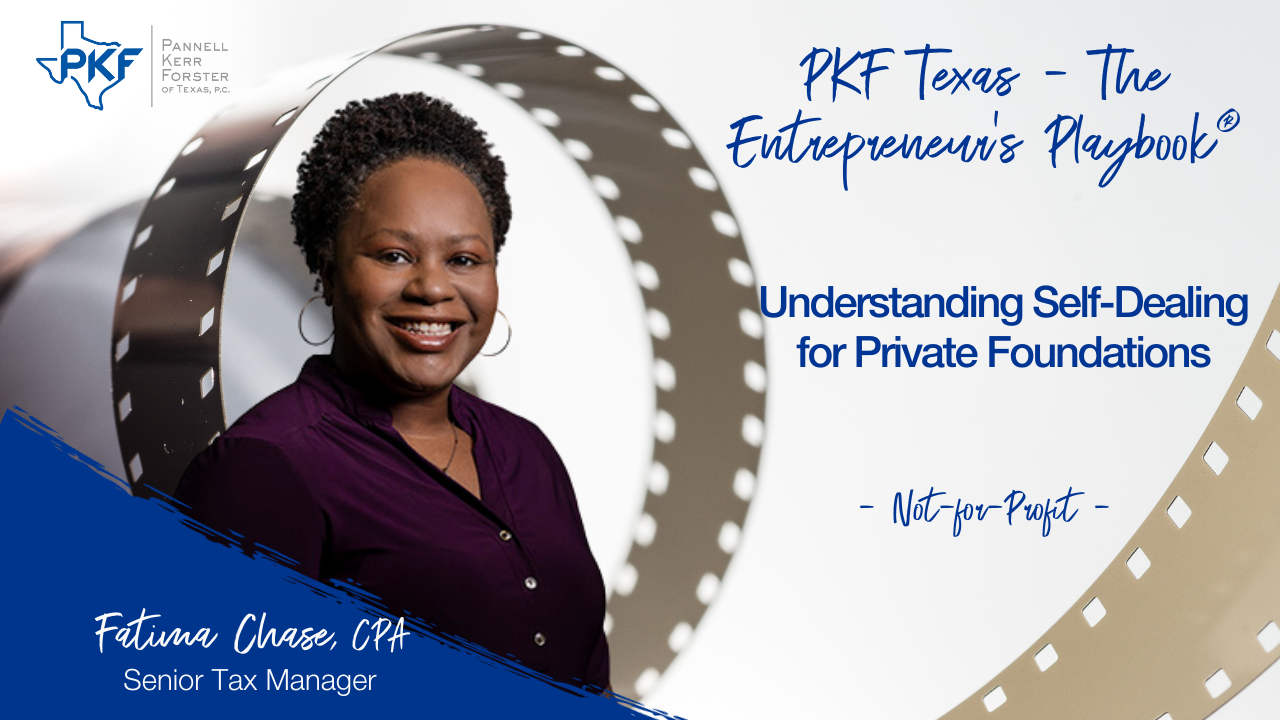Understanding Self-Dealing for Private Foundations

In this episode of PKF Texas – The Entrepreneur’s Playbook®, Jen Lemanski sits down with Fatima Chase, Senior Tax Manager and one of the Approachable Advisors® on our Not-for-Profit team, to break down the concept of self-dealing as it relates to private foundations. Fatima explains who qualifies as a disqualified person, shares common examples of self-dealing scenarios, and walks through the serious tax consequences that can follow if the rules aren’t followed. Whether you’re a foundation manager, donor, or advisor, this episode helps clarify why early planning is key to staying compliant.
Transcript Below
Jen: This is the PKF Texas – The Entrepreneur’s Playbook®. I’m Jen Lemanski and I’m here with Fatima Chase, one of the Approachable AdvisorsTM on our PKF Texas Not-for-Profit team. Fatima, welcome back to the Playbook.
Fatima: Glad to be back.
Jen: So, I’ve talked with Emily a while back about private foundations, but what we didn’t have the opportunity to talk about is private foundations and self dealing. So what is self dealing and what do private foundations need to know about that?
Fatima: So, in a nutshell, self dealing refers to direct or indirect acts between a private foundation and a disqualified person that results in that disqualified person receiving some type of personal gain. So I know you probably the next question you’re going to ask is, well, what is a disqualified person?
Jen: Yes.
Fatima: Well, a disqualified person, in short, is a person who has a significant influence over that private foundation. There are several categories of disqualified persons. So some of the ones we see most are substantial contributors. And substantial contributors are contributors or persons who are giving more than $5,000 to the foundation and more than 2% of those total contributions to the foundation. Then you have foundation managers, and that’s an easy one. It’s just your officers, your directors, and your trustees of the the foundation. And then the family members of those substantial contributors or foundation managers are also considered disqualified persons. So back to self dealing. Self dealing would include sales and lease and exchanges of property with disqualified persons. It would include lending money to or extending lines of credit to disqualified persons and furnishing goods or facilities to disqualified persons.
Jen: So that sounds like a lot of different things. Are there some examples that you can give?
Fatima: Take, for instance, say, ABC Foundation. I’m the director, and I notify them that my son is getting ready to go to college and I’m a little short on tuition payments. And they, you know, I’m such an awesome director to them that they decide, you know what, we want to give Fatima a loan for her tuition payments for our son. Well, as a director, I would be considered a foundation manager, and that loan, to me would be considered an act of self dealing. It would also be an act of self dealing if they decided to write out that loan to my son because he’s my family member. Another example would be, say I’m a substantial contributor instead of a director, and I give at least $5,000 to the organization. And sometimes my donations are all the foundation even gets. So it’s more than 2% of their total contributions. Say my business is looking for some rental space, and ABC decides, hey, we have some rental Space that we could, we could rent to you below market price. Well, that also too would be an act of self dealing because I’m getting some type of personal gain from that.
Jen: So in that vein, what are the consequences of self dealing?
Fatima: So we’ve all heard of excise taxes, right? And so there are a few excise taxes to list here. The first one would be a 10% excise tax that’s imposed on the disqualified person. It’s for all disqualified persons except for foundation managers. Foundation managers would be imposed a 5% tax instead of 10%. And then to complicate things even more, say the foundation doesn’t correct that act within that year. Well, then they’re looking at a tax of 200%.
Jen: That’s significant.
Fatima: That is significant. And if for some reason the foundation manager doesn’t agree or cooperate with those changes, there’s an additional 50% tax imposed on that foundation manager.
Jen: Well, that sounds really complicated. Really interesting. And I know we’ll put a couple, like you mentioned, we’ll put a couple links in the transcript so that folks can access more in depth information about that. But I think the best thing to do would be to call you and walk them through the whole process before they even think about going down that pathway so that they know all of the what their tax risk could be.
Fatima: Is that right? Absolutely. The earlier we know about what our clients are trying to do, the better.
Jen: Perfect. All right, well, we’ll get you back to talk about some more not-for-profit topics. Sound good?
Fatima: Yeah, I look forward to it.
Jen: Great. This has been another Thought Teader Troduction brought to you by PKF Texas – The Entrepreneur’s Playbook®. For more information about this and other not for profit topics, Visit pkftexas.com/notforprofit.
